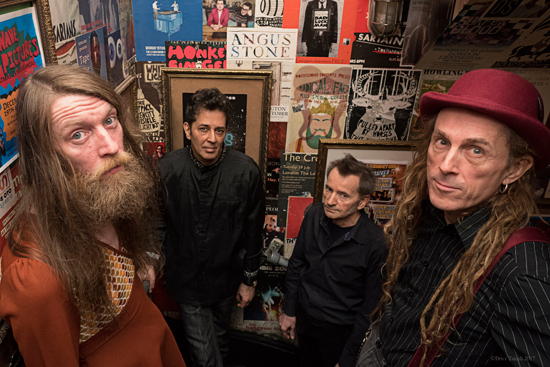
In most professional contexts, 40 years of service puts you squarely at retirement age. In the music business, it may as well be several lifetimes. Yet here’s Bid (née Ganesh Seshadri), for four decades the face, voice, guitarist and primary songwriter of the Monochrome Set, marking the band’s ruby anniversary with not only a boxed set of its long out-of-print first albums and singles but a new LP, Maisieworld, that further expands its sonic palette.
The Monochrome Set really should’ve been bigger. Or maybe not. Maybe, in a sort of Alice-through-the-looking-glass way, the band’s low-flame simmer is what’s allowed it to last this long.
“You know how it is,” says Bid. “To get on the charts, you need to sell a lot of records in a short span. We never did. But then, what was happening on the charts didn’t necessarily reflect what was happening in the clubs. And we had a huge live following. Many bands who were much more commercially successful than us at the time have disappeared. We kind of just carried on.”
And how. Witty, wildly literate and steeped in American psychedelia and experimental pop, the Monochrome Set’s warmly brainy music has long been a poorly kept secret among career oddballs from Morrissey and Marr to Franz Ferdinand. But the Set’s earliest work has been difficult to find, having been released and re-released on a smattering of since-folded small labels, making The Monochrome Set 1979-1985: Complete Recordings an especially happy-making occasion.
Sometimes the stars align: Just ahead of the band’s 40th anniversary in January of this year, Bid discovered that the rights to the Monochrome Set’s first two albums, Strange Boutique and Love Zombies (both 1980), had reverted to him, after years of languishing under various ownerships. The band also had recently moved to a new label, Tapete Records, that was not only gung ho on its new music but committed to curating a full retrospective of its formative years. Complete Recordings packages the Monochrome Set’s first two albums, plus 1982’s Eligible Bachelors and 1985’s The Lost Weekend (the Set’s only major-label release) along with all of its singles and EPs from the same period. Full lyrics and liner notes from Bid augment a deliriously rich six discs’ worth of music.
“It feels good,” says Bid. “We were always very inward-looking. We were often described as post-punk or new wave, but we were nothing to do with new wave. We were much more American in our leanings—garage rock, experimental pop, the whole Northeastern pop feel. It’s a bit like a band like Pere Ubu, who always went with their own thing, got it down tight and then took it to the public, and didn’t really worry much about the commerciality of it all.”
Looking back, Bid sees a kind of limited window that allowed bands like the Mono- chrome Set (and also Pere Ubu, for that matter) a rewarding longevity without ever having scored anything in the way of mainstream success.
“It was really only a period of the mid-’60s to the mid-’80s where there was, shall we say, a middle class in the pop-music industry,” he says. “Now it’s all the aristocracy: There are the Taylor Swifts and the Blind Willie McTells, and nothing much in between. It’s either massive stars or these sorts of troubadours who go around making stuff for people in bars. That’s why it’s quite important for us to play as many countries as we can. You can pick up newer audiences. Whatever rubbish you come up with, there’ll be someone in the world who thinks you’re great.”
—Eric Waggoner






